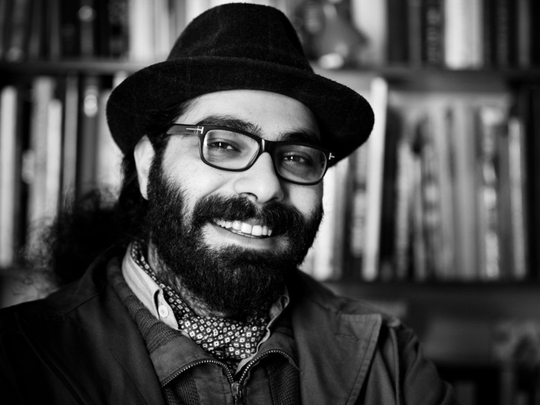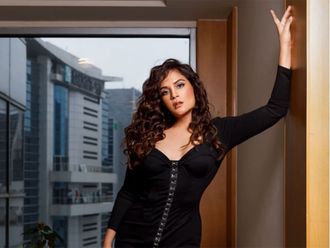
Hamid Sulaiman was born in Damascus in 1986 to a middle-class family and studied architecture before the civil war began in 2011. Having fled the country for Egypt, then Paris, he began working on his first graphic novel, Freedom Hospital, which was published in France last year and has just been translated into English. Strikingly drawn in black and white, it centres on a clandestine hospital set up by a young woman, Yasmin, in the early days of the Arab spring and tells the story of the doctors, patients and revolutionaries who shelter there. Sulaiman now lives in Berlin and is finishing his second book.
How long did you stay in Syria after the conflict began?
Six months. I was one of the young guys who had a lot of hopes for the Arab Spring. And even though a lot of people don’t believe in it any more, even though the reality is really shocking, I still hold on to this dream.
What is your dream?
Freedom, peace. I still feel optimistic, despite all the chaos. At the beginning of the Arab Spring, people thought totalitarian regimes would just disappear and we would have democracy. Everyone, including the western media, was naive about this. But I think we’re witnessing the final chapter for military dictatorships all over the world — it’s getting written bloodily, with a lot of conflicts, but it’s coming to an end.
What compelled you to leave Syria?
I participated in the movement, I was in prison three times — for a night, two nights, a week. Then I was summoned to court to be judged for helping terrorists, so I had to flee.
Was it a hard decision?
It was only after I arrived in Egypt that I fully realised, “Oh [expletive], I am out already.” Writing Freedom Hospital was a way of imagining where I would be if I had stayed. There is always this question: should I stay, should I leave, what are the dangers? If you believe in something this much, should you leave it? Each scene in the book is a reaction to that question. For example, I drew footage from YouTube. This is because I was outside Syria watching footage of shelling and bombing in neighbourhoods where I had friends I couldn’t contact.
Houria, the fictional town where Freedom Hospital takes place, feels like a microcosm for Syria: it contains idealists and freedom fighters, Assad loyalists and members of Isis. Were you trying to encapsulate the entire conflict in the book?
I was more trying to understand things for myself. When you are inside the conflict, you can’t understand other perspectives. It’s like a football player: he’s on the green square, he doesn’t think of what’s going on, he’s just performing. It’s only after the match is over that he can realise what’s been happening.
But distance doesn’t always help. For the rest of the world, the conflict in Syria can seem incredibly confusing.
Even in Syria, it’s confusing. Each district has a different situation: in one street people are starving to death, in the next people are staying in five-star hotels. I didn’t want to be objective, I just wanted to understand, to speak the tongue of the other. Why this person would believe in this, and why violence is the only tool of communication you have. This is why I didn’t present villains or heroes in the book. The guys of the Islamic State [Daesh], for example, are just following their circumstances.
Can you genuinely empathise with members of Daesh?
Certainly. They are victims. All soldiers who are participating in this war are victims. I am privileged: I studied, I speak languages, I could find my way out. The middle class is a minority in my country; most Syrians didn’t have access to school. Now the only work they can do is war. When the only people who will defend you and give you money are extremist groups, it’s normal to end up with them. These are circumstances that the whole world is responsible for, actually.
The book is dedicated to your friend Hussam Khayat, who was tortured to death in prison by the Syrian secret police. Could you tell me about him?
He was my closest friend in Syria from 2005 until my last days there. Even after I left Syria I was talking to him on Skype. He was looking forward to reading my book so much. He was a dreamer too: never down, always up. In 2014, he was finishing his studies and had one class left before he could graduate and leave the country. Then he was arrested and a week later they called his mother to collect the body.
Do you still have friends and relatives in Syria?
Fewer and fewer. The guys who stay there, the regime considers that they should be doing their patriotic duty to defend the regime, and the Islamists say they should do their duty to defend Allah, so they’re targeted by everybody. A friend of mine who visited Damascus recently said that the only guys you see in the street are soldiers.
How carefully do you monitor what’s going on? Are you watching the news every day?
It depends. Recently less and less. It’s the same news, the same misery. I don’t enjoy watching all the horrors coming out of Syria. Like any Syrian, I am suffering trauma from all this huge violence. Writing this book and doing what I do is my way of treating it.
Why did you choose the graphic novel form?
First of all, there’s an economical advantage: you can tell a story by yourself without the huge production team you’d need to make an animation. Also, I find that this medium is a good way of meeting other cultures and communicating experiences, especially in tough situations that are difficult to access.
If the war ended in Syria, would you want to move back? Or do you feel at home now in Europe?
I would like to go back when there is peace, certainly. When you lose your home you can never feel at home again. Still, I was educated in a European way so I don’t suffer being here at all. In fact it’s maybe easier for me to live in Europe than in a conservative society. My motive for participating in the Arab Spring was because I felt exiled in my own country — a patriarchal society with religious institutions and a secret police system that go really deep into each citizen’s life.
You live in Berlin now. What brought you there?
I loved Paris, but most of my friends from Damascus were moving to Berlin. A lot of Syrian restaurants and shops and events are in Berlin. As a city it is really dynamic and modern. I go a lot to the theatre, to see bands. I play a lot of basketball.
What is your second book about?
It’s about the 1982 massacre in Hama [where the Syrian government cracked down on a Muslim Brotherhood uprising, killing more than 20,000 people]. There are lots of similarities between that and what’s going on now — a lot of the same people are involved, on both sides. At the same time, I’m talking about being an artist haunted by the ghosts of the war. It’s due out in France in March and we’re looking at dates for Germany now.
Have you finished writing it?
Don’t tell my editor, but not yet. I’m procrastinating, playing basketball. This is how my writing gets done. I work better under pressure.
–Guardian News & Media Ltd
Freedom Hospital by Hamid Sulaiman is published by Jonathan Cape.









